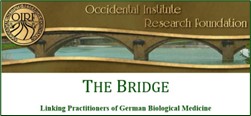Now, as we prepare to launch into Dr. Simon Yu’s article on a “Time to Die” I ask your forbearance for yet a few more comments from me – your newsletter editor and OIRF director. As Dr. Yu mentions first thing, “Death and dying is a touchy subject.” You’ve all read my rants about how we are losing the “old rabbits” of Biological Medicine with the passing of so many great practitioners and researchers. Our field of medicine is no longer “sparkly new” – for example the history of EAV dates back to the early 1950’s making this diagnostic method more than 60 years old. Many of the original innovators and researchers have simply made the transition and have left further development in the hands of the so called younger generation. This is a great responsibility for each and every one of us. With modern technology and communication abilities, it is easy to see health fads come and go in a flash. It is up to us as practitioners, healers and researchers to ensure that the work, methods and benefits of Biological Medicine are carried into the future. It is also up to us to ensure that we are able to respond professionally, effectively and (dare I say it) scientifically to the situations similar to the current media blitz of mis-information concerning vaccinations.
But, be that aspect as it may, we also have to think about our patients. For our patients the above discussions are of no interest as they deal with severe and terminal illness. They need the reassurance and faith that their natural medicine practitioners can help and assist them through this frightening time of transition.
Did I mention that Dr. Yu’s article arrives in a timely manner? Just this week the Supreme Court of Canada overturned the legislation banning the right to physician assisted suicide for terminally ill adult patients of sound mind. I’m not going to go into or try to dictate my personal beliefs on this issue. It is simply not my place. This is an issue that changes our perception of the inevitability of death, and each and every one of us as practitioners must carefully discern how we will counsel and work with our patients.
 Within the personal realm, in the past year I (Carolyn) had to deal with all the facets of severe life threatening illness and recovery in an elderly parent while continuing to work fulltime and care for our home. In just the past week both Elaine and I have had to deal with the loss of beloved feline companions to illness and old age (Elaine’s Russian Blue “Licorice”, 13 years and Carolyn’s Abyssinian “Missy”, 11 years seen here posing with Carolyn’s birthday flowers). These personal experiences not only change our perceptions as practitioners, but now we have also become the patients. There are no easy or clear cut choices. There can only be the acceptance that life will change, life will go on and that death will come to each of us.
Within the personal realm, in the past year I (Carolyn) had to deal with all the facets of severe life threatening illness and recovery in an elderly parent while continuing to work fulltime and care for our home. In just the past week both Elaine and I have had to deal with the loss of beloved feline companions to illness and old age (Elaine’s Russian Blue “Licorice”, 13 years and Carolyn’s Abyssinian “Missy”, 11 years seen here posing with Carolyn’s birthday flowers). These personal experiences not only change our perceptions as practitioners, but now we have also become the patients. There are no easy or clear cut choices. There can only be the acceptance that life will change, life will go on and that death will come to each of us.
As I considered Dr. Yu’s article and our recent personal experiences, I was reminded of another article written by Dr. Bill Benda for the Integrative Medicine Clinician’s Journal back in 2007. Even all those years ago we were hearing about the advancing wave of aging baby-boomers, and the choices and decisions that we would need to make both as practitioners and as patients ourselves. I have reprinted that article again later in this Issue, or please follow this link to “Till Death Do Us Part”.
We send our personal and sincere thanks to Dr. Yu for this perceptive and very timely article on the relationship the practitioner or physician must have with his patients in order to talk about this on a daily basis and in order to accept the inevitability that we cannot always heal the illness or stop the transition into death.
This is the link to Dr. Yu’s newsletter article, “Time to Die”.
 An Introductory Commentary for Supporters
An Introductory Commentary for Supporters
From THE BRIDGE Newsletter of OIRF
Published February 2015
© Copyright 2015, Occidental Institute/Winsor, BC Canada
Now, as we prepare to launch into Dr. Simon Yu’s article on a “Time to Die” I ask your forbearance for yet a few more comments from me – your newsletter editor and OIRF director. As Dr. Yu mentions first thing, “Death and dying is a touchy subject.” You’ve all read my rants about how we are losing the “old rabbits” of Biological Medicine with the passing of so many great practitioners and researchers. Our field of medicine is no longer “sparkly new” – for example the history of EAV dates back to the early 1950’s making this diagnostic method more than 60 years old. Many of the original innovators and researchers have simply made the transition and have left further development in the hands of the so called younger generation. This is a great responsibility for each and every one of us. With modern technology and communication abilities, it is easy to see health fads come and go in a flash. It is up to us as practitioners, healers and researchers to ensure that the work, methods and benefits of Biological Medicine are carried into the future. It is also up to us to ensure that we are able to respond professionally, effectively and (dare I say it) scientifically to the situations similar to the current media blitz of mis-information concerning vaccinations.
But, be that aspect as it may, we also have to think about our patients. For our patients the above discussions are of no interest as they deal with severe and terminal illness. They need the reassurance and faith that their natural medicine practitioners can help and assist them through this frightening time of transition.
Did I mention that Dr. Yu’s article arrives in a timely manner? Just this week the Supreme Court of Canada overturned the legislation banning the right to physician assisted suicide for terminally ill adult patients of sound mind. I’m not going to go into or try to dictate my personal beliefs on this issue. It is simply not my place. This is an issue that changes our perception of the inevitability of death, and each and every one of us as practitioners must carefully discern how we will counsel and work with our patients.
As I considered Dr. Yu’s article and our recent personal experiences, I was reminded of another article written by Dr. Bill Benda for the Integrative Medicine Clinician’s Journal back in 2007. Even all those years ago we were hearing about the advancing wave of aging baby-boomers, and the choices and decisions that we would need to make both as practitioners and as patients ourselves. I have reprinted that article again later in this Issue, or please follow this link to “Till Death Do Us Part”.
We send our personal and sincere thanks to Dr. Yu for this perceptive and very timely article on the relationship the practitioner or physician must have with his patients in order to talk about this on a daily basis and in order to accept the inevitability that we cannot always heal the illness or stop the transition into death.
This is the link to Dr. Yu’s newsletter article, “Time to Die”.
From THE BRIDGE Newsletter of OIRF
Published February 2015
© Copyright 2015, Occidental Institute/Winsor, BC Canada
About the author
Carolyn L. Winsor
Carolyn’s decades-long involvement with the work of OIRF has given her the tools and skills to offer you unique and valuable insights into the ongoing developments in this always expanding field. Her Biological Medicine background includes:
Credentials
Featured News
The Consequences of Excess Sympathetic Nervous System Drive on the Cardio-Vascular System
This thesis applies specifically to the action of the SNS upon the cardio-vascular system. This thesis is for your understanding. It is not meant [...]
MORA BioResonance Therapy
A Complementary Medical Method Comments from the Director: This article has a very interesting history and was commissioned and translated [...]
A Chronological History
A Chronological History of the Occidental Institute Research Foundation 1972 Doors open in Weston (Toronto), Ontario, Canada Traditional Acupuncture School Publication of Extension Training [...]
Cinnamon and Honey
Web Watch April 2009 Source Unknown, Submitted by Esther Treitl, OIRF Staff Facts on Honey and Cinnamon: It is found that a mixture of [...]
Sign-up to receive updates sent straight to your inbox